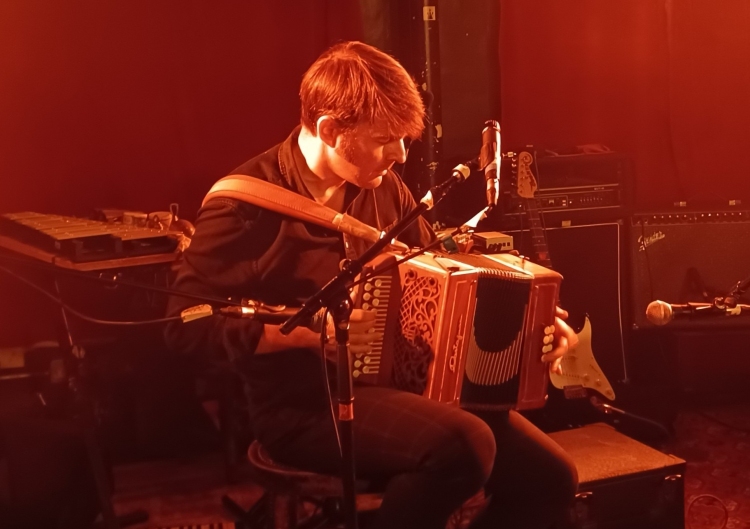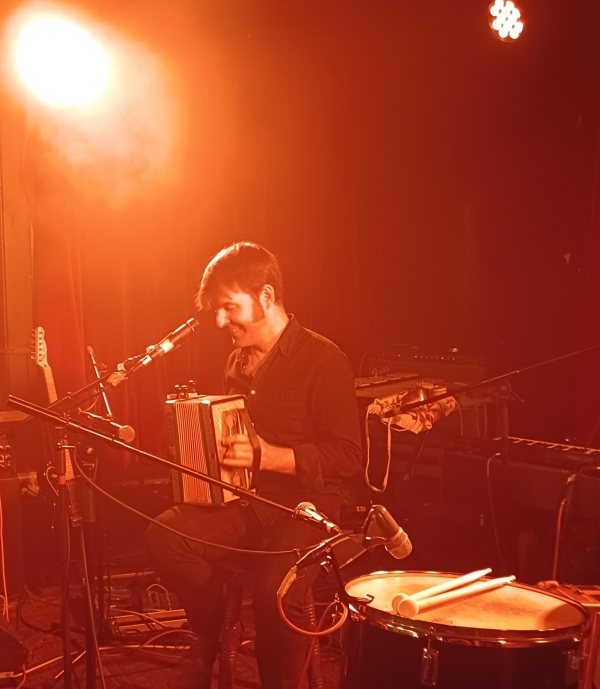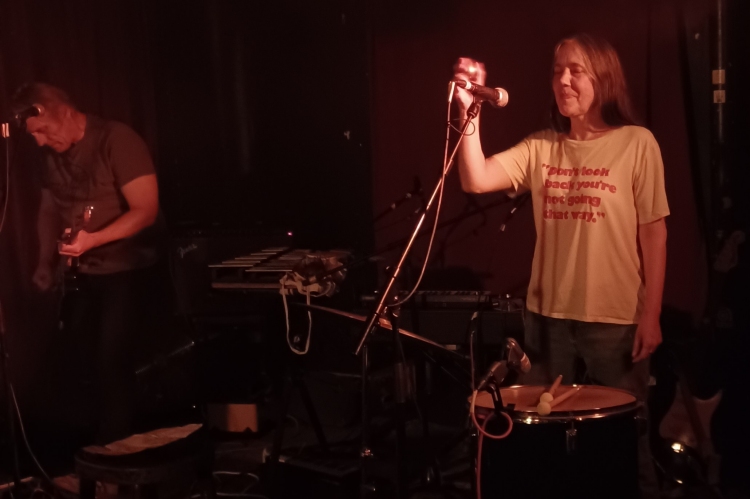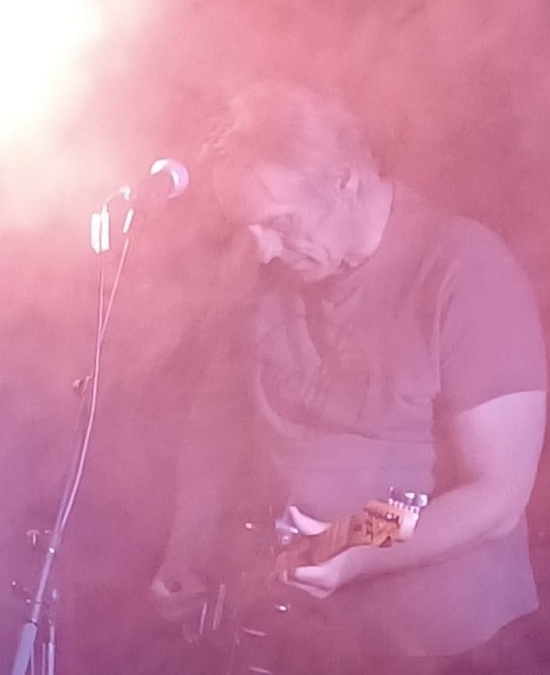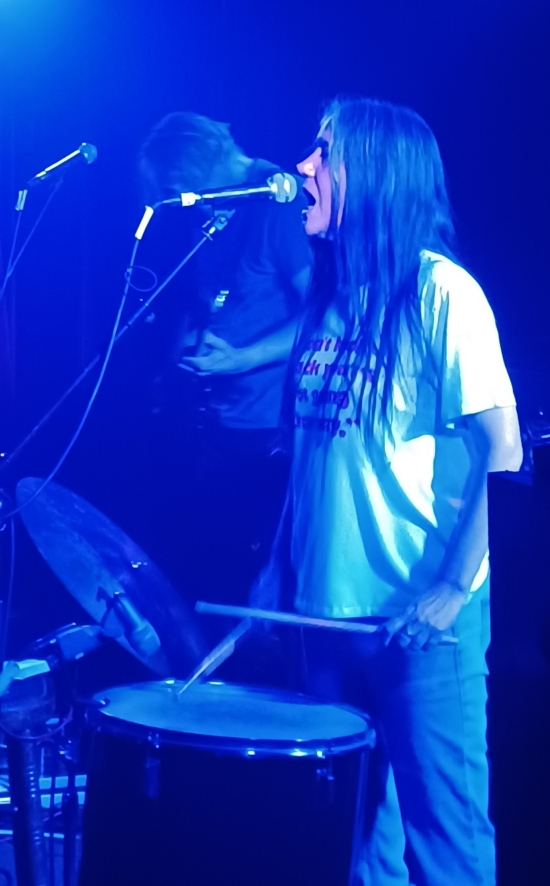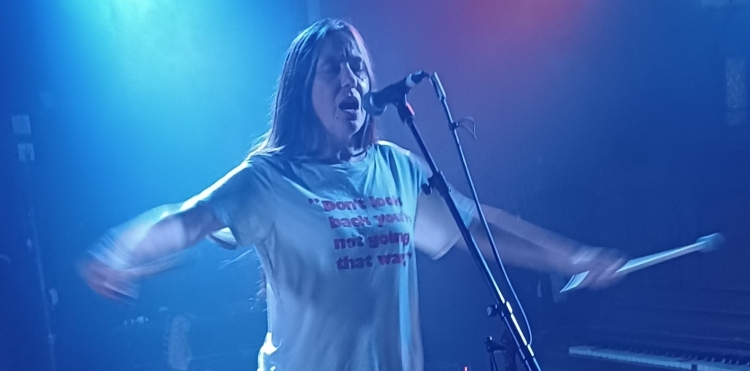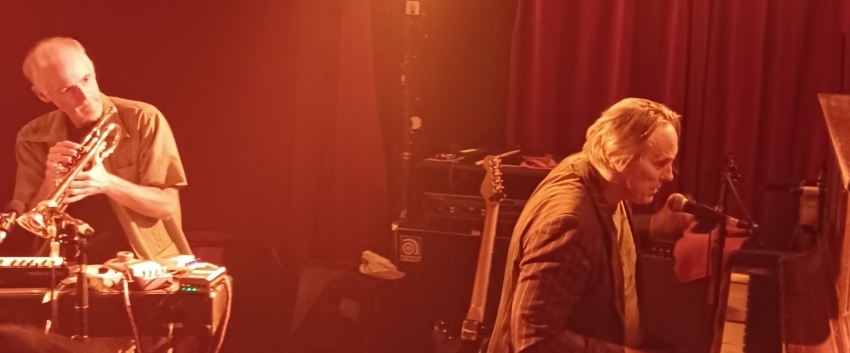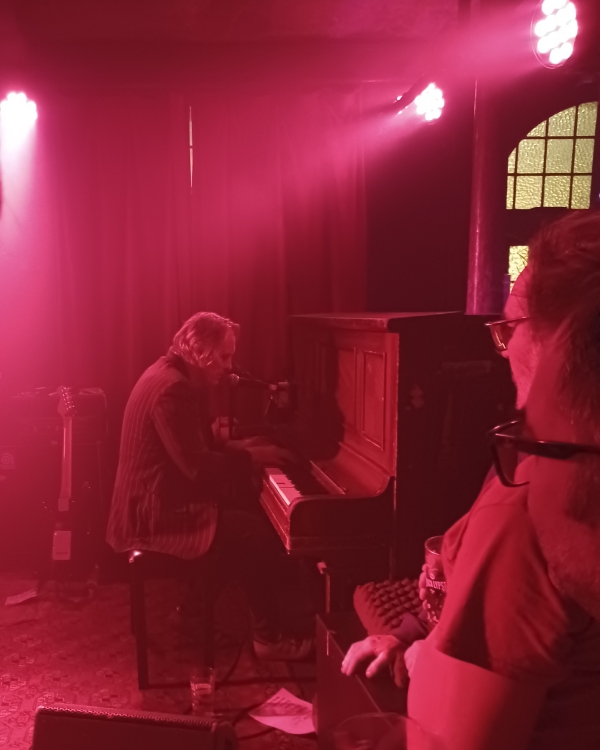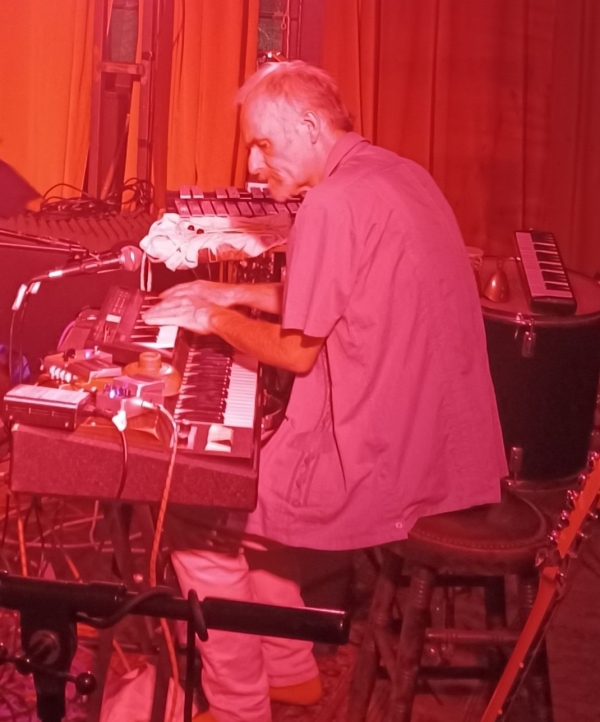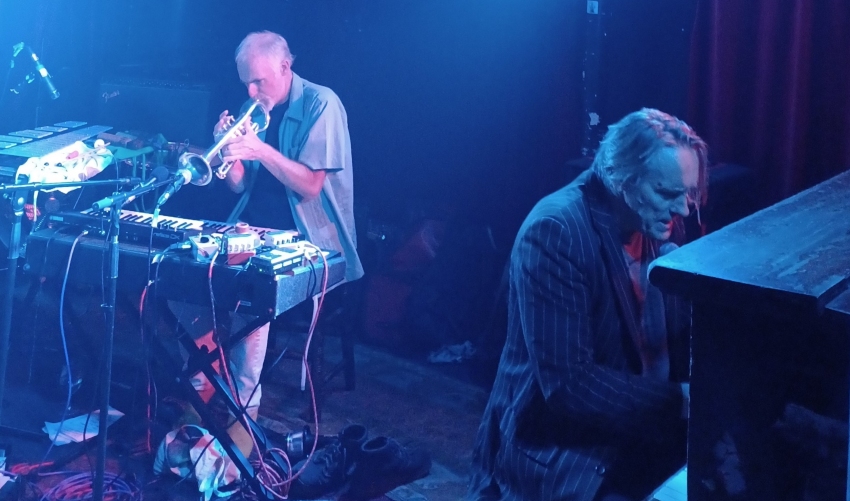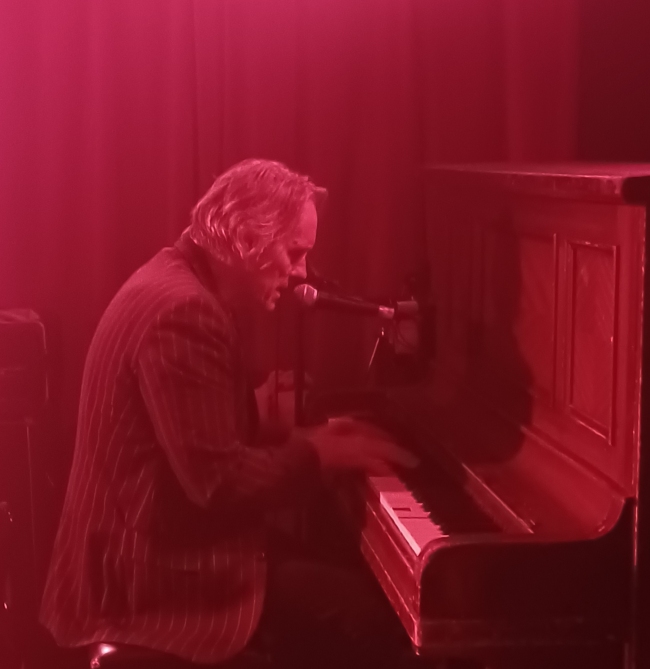The George Tavern, Stepney, London
Friday, 29th August 2025
Down at the Crayola Lectern show at the George Tavern — a stout, notched tooth of a building set into the bony drag of Commercial Road — there’s been a bit of a wobble. William D. Drake was supposed to co-headline with a set of his own, but a couple of days ago he was laid low by repetitive strain injury (or to put it another way, by a serious case of pianist’s nightmare). Now there’s the challenge of dealing with a pub full of people who were expecting a double-scoop concert of Anglo-psychedelic piano balladry, and who have to accept that one of the scoops is missing.
James Larcombe
Needs must, so family and friends step in at short notice. First into the breach is James Larcombe, toting a brace of melodeons and accordions and a headful of old British folk dance. Better known as a supporting keyboardist in Kugelschreiber and North Sea Radio Orchestra (as well as for his duo work with his brother Richard as Stars in Battledress and with Craig Fortnam in Arch Garrison), he’s also always been a folkie at heart, absorbing it as a family tradition and mixing it in with his more public enjoyment of complex modern psychedelia, math rock and avant-garde metal.
Tonight we’re getting the full-folk squeezeboxer James. Warm, enthusiastic, polite and squirrelish in his enthusiasm, he leads us on a dive into Morris, march and reel beneath the George’s russet spotlights, opening up with an encouraging canter through The Trayne of Artillery (the original Grenadier Guards March) before embarking on a segue through works by more contemporary free-reeders: Brian Dawson (Melody Iron) and Simon Ritchie (The Valiant).
Accomplished as he is, it’s not often that he plays this sort of stuff in public — he cheerfully admits that he mostly plays it at home for his own enjoyment — and nerves do show on occasion. There’s the odd wince at a fluffed note, and he frequently gently scolds himself for playing too fast. Yet such occasional mild missteps simply add to the intimacy and the welcoming nature of the performance, which sometimes feels like an invitation into his front room, especially when James plays us a pair of self-penned tunes written respectively for his wife and his sister.
Mild-mannered and self-deprecating he might be, but as a folk scholar and player James also knows his onions. As a few semi-accustomed audience toes and heels begin to rattle in accompaniment on the George’s floorboards, he deftly navigates a Herefordshire Morris pairing of Bromsberrow Heath and Foul Weather Call and an understated tribute to an old Derbyshire folk influence, Tufty Swift (via a rendition of The Chesterfield Two Bugle Horn Two-Step and Nottingham Races). He also treats us to a quick pre-performance explanation of The Abbots Bromley Horn Dance, a tune of mysterious origins dedicated both to a particular Staffordshire village and the annual folk festival which has happened there for half a millennia, but one which is apparently never played there, having been supplanted by more popular incomers such as Yankee Doodle. A pity, and it’s clearly Abbots Bromley’s loss, since James’ rendition is one of the highlights of his set. Spooky, slower, and serpentine, it feels like a peering into something deeper.
In spite of such occasional wanderings toward an older, wyrder England, the overall mood is of humble hospitality. James comes across not as some sort of lofty folk gatekeeper, nor as a muttering psych-folk charlatan, but more as a friendly tender of the folk fireplace, with stories optional and further unpackings available. There’s plenty of gentle humour, too: at one point, he plays an instrument which also appears to have its own built-in spoon section (for those fleeting Sylvester McCoy moments) and there are jokes about double-necked prog accordions. He finishes up with a good-humoured Morris-y skip-and-bounce through Glorishears (with some of our own clumsy feet attempt tapping and tag-along) and then he’s off, sweet and diffident as ever, having delivered a demonstration of just how much you can warm up the atmosphere in a cold room by pushing it through a set of reeds.
The Trayne of Artillery (Grenadier Guards March)
Segue: Melody Iron (by Brian Dawson) / The Valiant (by Simon Ritchie)
Bromsberrow Heath / Foul Weather Call
Segue: Sarah’s Tune / Fiona’s Tune
Chesterfield Two Bugle Horn Two-Step / Nottingham Races (from the repertoire of Tufty Swift)
Abbots Bromely Horn Dance
Glorishears
James Larcombe – Melodeons, Diatonic Button Accordions
LINKS: Facebook | Bandcamp | | Soundcloud
La Mômo
T-shirted, taciturn, seamed, and threshing black-tinged blasts and phased walls of fluid noise out of an electric guitar, Chris Anderson looks and sounds like die-hard garage rock incarnate. He certainly doesn’t look much like what his Crayola Lectern reputation might suggest. But then, right now he’s not doing Crayola Lectern. He’s playing in La Mômo tonight’s second gig-saving volunteer arrangement, stepping in at the eleventh hour. You might have heard of La Mômo, intermittently, via the rock scene on the West Sussex coast, within which they’ve been playing for about twenty years. Tracking them down on record … well, that’s a tougher task. Often reluctant to turn expression into commercial product (despite some close dalliances with bigger-name producers and broadcasters) they’ve been similarly reluctant to commit songs to release, with just a handful of songs floating around Bandcamp, YouTube or, years ago, on Myspace, if you can find them. So — live it is.
Once upon a time, La Mômo were made up of two married couples, and prompted comparisons to a space-punk ABBA (if ABBA had had more of a touch of Brighton beer-can glamour). Now they’re just one couple, plus backing tapes, delivering a fluent, rumbling, sky-skimming mixture which clings offhandedly to Stooges immediacy, Hawkwind pulse, Krautrock dryness and clap-along pop, with a stirring hint of woman-unchained punk and art-school splash. There’s also a touch of Gothic rock, with the relentless programmed drums, rolling taped bass and momentum suggesting Vision Thing-era Sisters of Mercy, even if the dress code doesn’t. On paper, they might not have sounded like the best fit for the evening; but with the stage lights turned up to a white-heat dazzle’n’flash, and in front of a Larcombe-warmed crowd, La Mômo hang in there by charm and goodwill, and turn out to be a whole stableful of dark horse. Even if you didn’t come for the art-punk, you can stay for the space-rock.
Despite all of that assured guitar work (and his contrary backing vocals, with their one-man hint of ‘60s girl-groups), Chris isn’t the focal point here. That’d be Sadie Anderson, looking like a well-travelled ship’s figurehead who’s suddenly jumped ashore and then run gleefully through a Riot Grrrl t-shirt convention, She sings; vigorously pounds a cymbal and a floor tom; steers the mood and commands the attention. For the motorik boogie of Sweet Talking Eyes, she bounces around flailing her percussion. For Back Up ID, she picks up her own guitar and plays against Chris, delivering slashing higher-up chords as a counterpoint against his relentless dustbin churn and sludgy wah-solo. At times, she grits her jaw against an invisible gale. At others, there’s an easy smile at the thrill of performance.
Style and sound are easy to get, then; but what La Mômo seem to stand for is initially harder to unearth from under their set’s sound-and-light bombardment. With Sadie’s vocal firm but half-lost in the noise, what spins out are mere hints; or perhaps the lyrics are lightly loaded with evasive clues. Bounced images and flashes of suggestion make their way across; but what make the strongest points are moments of emotion hung onto and spun around. On A&E, something shrills behind Sadie and Chris on tape, a background panic in front of which they can strut their assurance and weathered cool. The two-guitar “drinking day” shove of Lobotopop seems to revel in hedonism, and in switching off the forebrain. As the band head into Tricky Day. Sadie announces “got your pop song coming up!” Sometimes it’s enough to live and to respond in the moment. Perhaps?
Digging a little deeper, though, one of La Mômo’s unspoken but embodied determinations seems to be not allowing middle-age to pin them down or restrict them, while simultaneously not turning this into an embarrassing display of mutton-dressed-as-lamb. Despite the inevitable personal weathering over the years, they’ve kept in touch with their youthful inspiration and have been wise enough to preserve it rather than pickle it, letting it shape them and carry them along, settling into them like fine wood stain. Squinting at Sadie’s T-shirt under the light-show, I can read “don’t look back, you’re not going that way” printed across her chest. For all of their garage immediacy, this is something La Mômo seem to stick to, paring back those old revolt-into-style impulses to the barest and most pertinent of enduring bones.
Live Your Cinema, in particular, takes classic yearning fleapit glamour and self-discovery and sharpens it back up again. (“I’m not taking you out to the movies / I’m going to take you out to see the stars”). Even with Sadie back on her stand-up drums, it’s softer by La Mômo standards — and more wistful — but she still ties it in with question-chucking, with rebellion glamour, and with liberation politics. “If I don’t count, then Elvis doesn’t count… If I don’t shout, then Marilyn couldn’t shout”. They end their set with Zero G, with its backing of widescreen space-gurgle. Space-age imagery maintains an ageless appeal too, I guess.
Sweet Talking Eyes
Back Up ID
A&E
Lobotopop
Tricky Day
Live your Cinema
Zero G
Sadie Anderson (Sadie Mômo) – Lead Vocals, Electric Guitar, Floor Tom, Cymbal, Drum Programming
Chris Anderson (Cola Ray) – Electric Guitar, Backing Vocals
LINKS: Website | Facebook | Soundcloud | Discogs
Crayola Lectern
It’s funny how a change of jacket and a change of posture can transform a person, even at close range. Minus guitar, plus pinstripes, and hunched over a piano, Chris has shed his seasoned-rocker look for the rumpled elegance of his Crayola Lectern style. Now he looks like a thoughtful, half-distracted Bill Nighy character, one who’s crossed paths with Thelonious Monk.
If being older was something which La Mômo worked around subtly, for Crayola it turns out to be an actual boon. At a certain age, there comes a certain weariness. Irresolutions; compromises congealing; dealing with declining and dying parents; physical and emotional aches which weren’t there before; a sense of betrayal regarding the world’s potential. Chris’ songs capture this collated feeling perfectly, but rather than moping within it, Crayola’s processes polish it to a fine mother-of-pearl sheen and leave it floating in the atmosphere as something to be dealt with via grace, compassion and occasionally a bit of counter-cultural stubbornness, all wrapped up in a coat and taken to the cliff-path.
A Crayola song is a slow thing — a thing of accumulations, really, pouring in like a blue-souper of mist, echo and reminiscence. Chris’ skeleton structures of thoughtfully trudging, blues-y piano are enfleshed by layers and swappings of sound from the other half of the Crayola duo: Alistair Strachan, working out things on trumpet, a variety of little keyboards and assorted percussion, plus a little sound-mixing trickery. On album, Chris and co. have the chance to intermittently lean into more electric psychedelic territories, with guest guitarists stretching and pulsating pieces out into long lysergic suspensions. Live, they don’t have that particular indulgence, so it becomes almost entirely about voice, hanging shapes and sketches of brass, and the soft rain of felted hammers onto piano strings. For my money, it’s a loss that in many respects makes them better; steering them back from that highway-to-the-stars effect while allowing its ghost to settle onto the uninterrupted bones of the songcraft, like a remembered seasoning.
Sad Cornetto ambles them into being tonight. An introduction of autumnal piano and trumpet duet, garnished by Chris’ gentle wordless croon, shades almost imperceptibly into a kind of half-melted blues on piano and glockenspiel. In fragile tones, Chris sketches out a picture of diminishing times and resurgent cruelties — “it didn’t take long for the fourth wall to fall / and where feathered friends (who you dared to hope had gone for good) / predictably resurface again”. The rhythms and cadences fumble out a companionship between Edwardian parlour music and slow Latin folds, as the words grow angrier and more battered (“billionaire moguls in golden canoes poison the world and dictating the news, stitch up our water, zip up your face, frame it as your mistake”). It gradually, gradually plays out to a background of softly-textured trumpet (vocal-ish puffs and weary melodies) and a bubble of brooding synthesizer.
For the whole set, Chris and Alistair more or less have their backs to each other. Like a very slow and assured mountain goat, Chris precariously works his way around the George’s battered pub instrument with its treacherously sticking keys. Alistair sits a little offset and displaced, perched like a jockey but with his eyes, hands and attention mostly focussed downward, like a jeweller absorbed in precision work. Their backs are turned, but they’re listening, as jazzers do; to the shapes and choices the other is making. While the Crayola touchstones are always going to be the muted, melancholic conscientiousness and economy of Robert Wyatt (with a touch of Syd Barrett life-burn and cool jazz-ambience delicacy), other associations come floating through the vapour. In the long attenuations of song and their thinning spread of sustained mood, in the stretched-out, hard-to-follow murmurs of lyric, in the touching mixture of nakedness and reticence within Chris’ singing, it also touches, lightly and lovingly, on the later work of Mark Hollis.
Maybe it’s got something to do with Crayola’s coastal home – the feeling that you’ve travelled to the edges of the land, and must live there with what you still need to carry – but many of the songs deal with the acceptance of fraying and disintegrating. Cradled within a hollow, rolling wave of piano, Aparty Days emerges as a fragile, understated love song to an ageing loved one, with struggling reminders to stay in the present (“holding hands on country lanes / was not so long ago, before aparty days…/ Anoint the person that you used to be, / calling out to be with you, / holding hands on motorways, / essential trips… Don’t look back or try to see / beyond the ghosts…“). Dissolve applies the same lens to the slow fade of a small-town hard man – “Angelito lived in darkness, descending, / did his best to keep his corner alight / and the words he sang just kept disappearing, / all lost into an endless night. / On the ropes in this old fight.. / Used to be a face in his home town, / now he’s just invisible man”. Similarly, the title track to this summer’s Disasternoon album dwells on end days and on death in California, wrapping up a few loose ends and personal surrendering before pulling out to a final shot of a disappearing earth. It’s grim, but Alistair and Chris’ soft playing (and their ability to bypass moping while whipping individual emotion up into a kind of towering shared celebration of human vulnerability) mean that it lands, live, as a kind of balm. As they play, the lighting gently washes them in gradual cross-fades of marine blue, of deep violet, of autumnal red, as if it doesn’t want to interrupt.
It would also be a mistake to confuse this melancholia and acceptance of life’s dissolvings for a full glum surrender. As we’ve seen, Chris isn’t beyond taking a side-swipe at corrosive capitalism; and he does so again on Rescue Mission, with its evidence of ongoing life and more assertive calls to energy and action (“don’t give up don’t give in… don’t let me go.”) Elsewhere, he’ll muse on being “strong enough to survive modern life… strong enough to withstand hands of man.” These slivers of resistance against the dying of the light well up from under the starry duvet of the Crayola Lectern sound, while the saloon-bar rattle-suddenly-turned-serenade of Barbara’s Persecution Complex (“don’t be a stranger, so lonely…”) ultimately whispers for good-humoured connection. We don’t get the full head-bobbing McCartney-isms of I Forgot My Big Idea tonight, but we do get its floating coda, during which Alistair makes his trumpet into a whale call.
Much of the information, it’s true, is indirect, since what one mostly takes away from this evening is encoded deep inside Crayola Lectern’s instrumentals. Stars over Louth is a wordless nod to the aforementioned Wyatt and his Lincolnshire home town, and one which puts its own spin on the man’s good humour. With its woodblock taps, bell-rings and pudding-piano, you half-expect a puppet horse to come jogging around the lip of the stage (or perhaps what might have happened had the late Jamie Muir been cajoled into refashioning his vivid percussion-pictures from Larks Tongues in Aspic for kid’s TV). Alistair, meanwhile, transforms his trumpet into a sea cave by breathing through it rather than blowing, conjuring a fret of Sussex fog. Moving through the giddy fairground symphonics of Rise and Fall, Crayola end by folding into the delicate ambivalent pact-of-connection in Oblivion: Chris tolling out soft padding piano, while gently carolling “hold me in your arms, hold me close… hold me in your harm… down and down and down we go”). The set rolls to a protracted close with a loose, mostly-instrumental segue of Billennia (perhaps a nod to the absent Drake), Wholetoner (a warm scurry across the ground between Philip Glass and Cardiacs) and the romantic resistance of Awesomne View, in which Chris unleashes a last defiant left-leaning murmur-salvo. (“Deceitful Conservative bastards / insult my intellect, / suck the place dry. / Blind to beauty, / quite unaware of / magnificent views.”)
People have been calling for Slow Down for a while now, and Chris duly obliges by playing it out as an encore and evening closer. While much of the preceding blue vapour has been Crayola Lectern at its transcendent best, this will probably always be the project’s signature song. It’s a small mischievous smile, hangdog and lugubrious, sympathetic and sarcastic, chiding a try-harder. “You move too fast, racing everywhere as if you’ve got a rocket up your arse. / You can’t see the little children behind parked cars that you pass, / and you’re not going to be the king of the road, oh no. / ‘Cos dreams they explode, / when you’re living with a heavy load”. The audience sings along, gently, perhaps united in the thought of a slower, kinder world in which the most egregious burdens can be set aside and maybe, just maybe, a little friendly mischief can pop up sometimes like a daisy.
[Photos by Dann Chinn]
SETLIST
Sad Cornetto
Aparty Days
Rescue Mission
Disasternoon
Stars over Louth (instrumental)
Rise And Fall
Oblivion
Barbara’s Persecution Complex
Dissolve
Billennia (instrumental, mostly)
Wholetoner (instrumental)
Awesomne View (instrumental)
I Forgot My Big Idea (coda)
~ Encore:
Slow Down
MUSICIANS
Chris Anderson – Vocals, Piano
Alistair Strachan – Trumpet, Micro-Synthezizer, Melodica, Organ, Glockenspiel, Shaker, Scraper, Sound Processing
LINKS
Crayola Lectern – Website | Facebook | Bandcamp | YouTube | Soundcloud | Onomatopoeia


